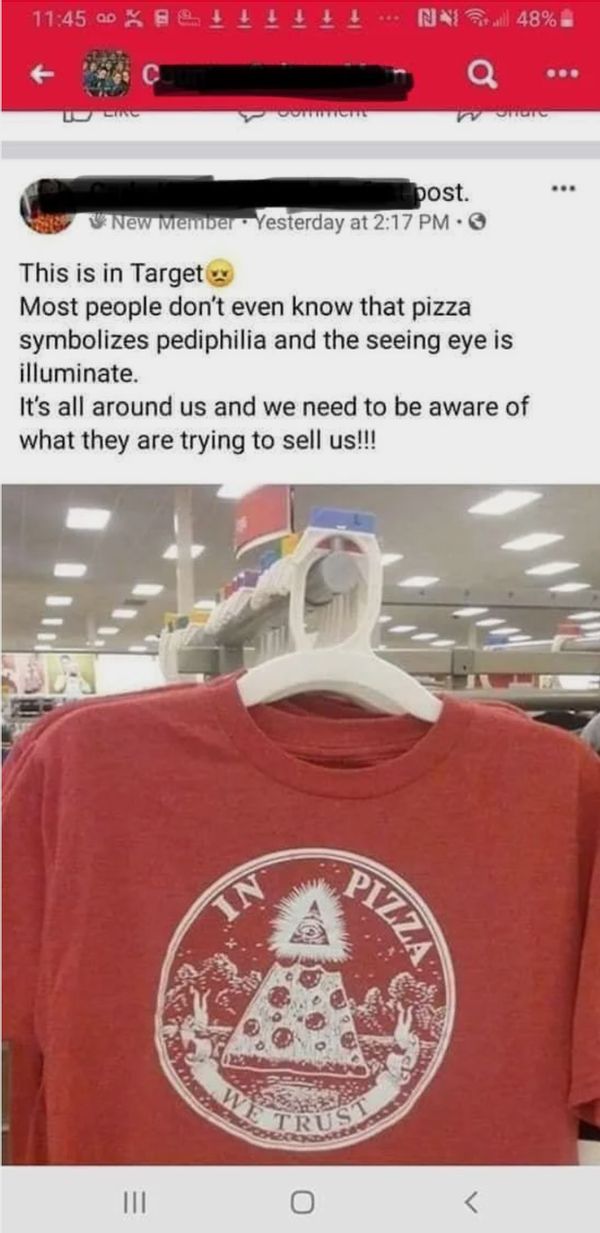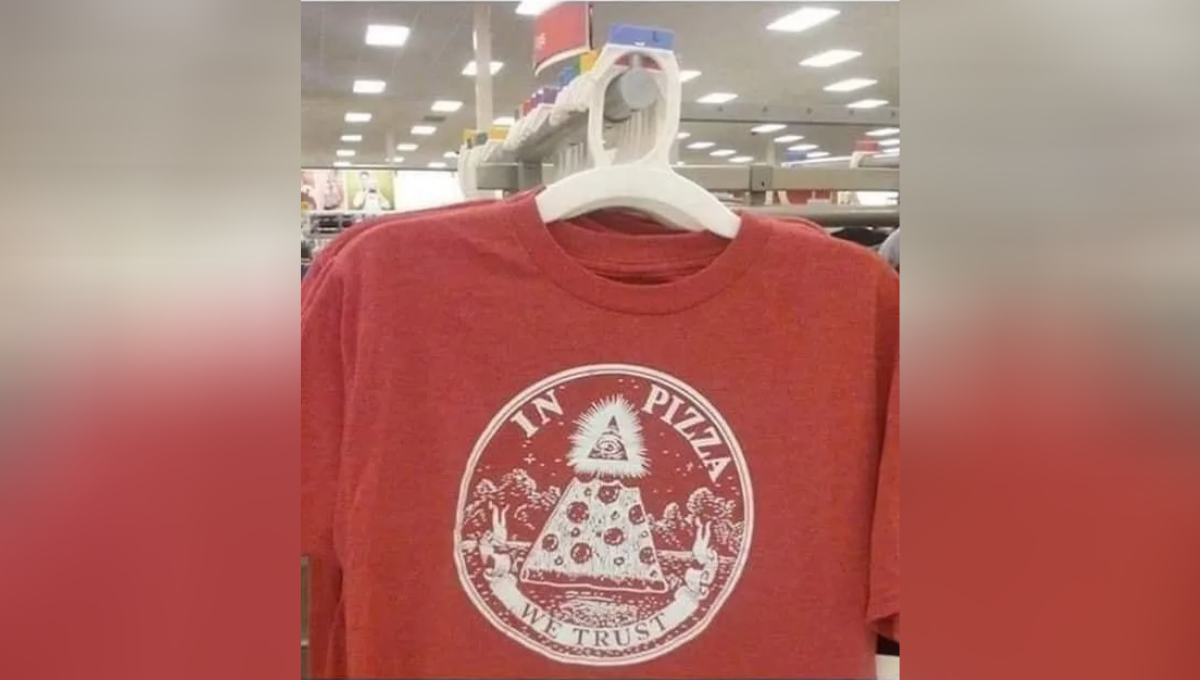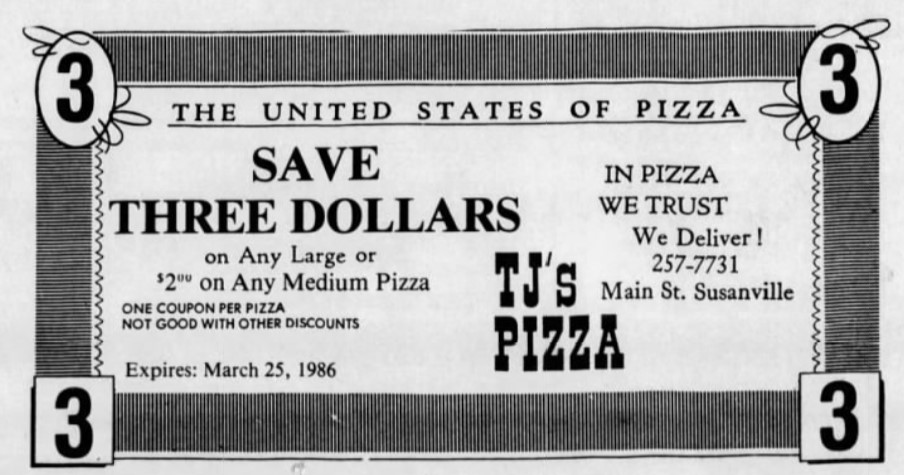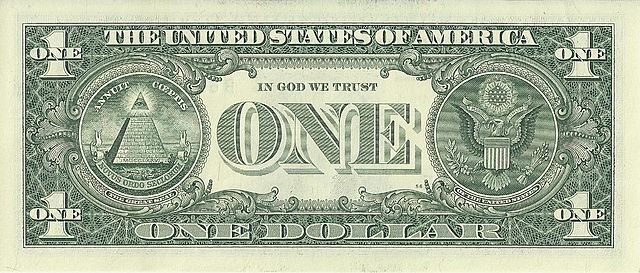Editor's Note: This fact check was reviewed and corrected on June 9, 2023.
In August 2020, a photograph showing a T-shirt, reportedly being sold at a Target, bearing the slogan "In Pizza We Trust" circulated on social media along with the claim that the department store was endorsing, aiding, encouraging, or was actively participating in pedophilia:
 (Reddit)
(Reddit)
This appears to be a genuine photograph, though we have been unable to confirm this item was available at Target stores. A spokesperson for the chain told us the stores "don't sell this shirt," but it's unclear if it was available in years past (the above-displayed image has been circulating since 2018). Similar items can be found via online retailers.
Regardless of the item's availability at Target, neither the shirt nor the chain store has been credibly linked to pedophilia.
What Does Pizza Have To Do With Pedophilia?
The underlying claim in the above meme and others like it is that pizza is a secret symbol or "code word" for pedophilia.
The claim that pizza is a code word used by pedophiles first sprung up during the 2016 presidential election, after the email of John Podesta, the chair of Hillary Clinton's presidential campaign, was hacked by a Russian intelligence agency and published by Wikileaks. As internet users scoured through the illegally obtained material, they noticed some of the emails referred to "pizza."
This was an innocuous detail to most political observers — in one email, Podesta suggests using a pizza oven to cook dinner; in another, he suggests buying pizza for political volunteers. But 4chan users posited that the word "pizza" in Podesta's emails was actually a code word for pedophilia. The evidence? The first letters in the phrase "cheese pizza" — "C" and "P" — are also the first letters of the words "child pornography."
On 4chan itself, at least, "CP" and "cheese pizza" had, in fact, been already used for years by Anons (the anonymous users of the vast image and message board) as coded references to child pornography and pedophilia-related content. When they found the word "pizza" in Podesta's emails, they built a conspiracy theory around it. (It's unclear when, exactly, the phrase "cheese pizza" came into wider use as a code word for child pornography outside of 4chan, but there is concrete evidence that it was used as such at least as far back as 2017, when a Craigslist post containing the phrase played a role in the arrest and conviction of a Lodi, New Jersey, man for receiving child pornography.)
In December 2016, The New York Times dissected the evolution of this repeatedly debunked conspiracy theory:
- WikiLeaks began releasing emails hacked from the account of John Podesta, Hillary Clinton's campaign chairman, a month before the election.
- Social media users on a popular Reddit forum dedicated to Donald J. Trump and 4chan's far-right fringe message board searched the releases for evidence of wrongdoing.
- Within the emails were discussions that include the word pizza, including dinner plans between Mr. Podesta and his lobbyist brother, Tony Podesta.
- A participant on 4chan connected the phrase "cheese pizza" to pedophiles, who on chat boards use the initials "c.p." to denote child pornography.
- Following the use of "pizza," theorists focused on the Washington pizza restaurant Comet Ping Pong. The WikiLeaks emails revealed that John Podesta corresponded with Comet's owner, James Alefantis, who had connections to Democratic operatives.
- The theory started snowballing, taking on the meme #PizzaGate. Fake news articles emerged and were spread on Twitter and Facebook.
- The false stories swept up neighboring businesses and bands that had played at Comet. Theories about kill rooms, underground tunnels, satanism and even cannibalism emerged in fabricated stories and on social media.
- On Dec. 4, Edgar M. Welch, a 28-year-old from North Carolina, arrived at Comet with a military-style rifle and a handgun. The police said he fired the rifle inside the pizzeria, hurting no one, and surrendered after finding no evidence to support claims of child slaves being held there.
- The shooting did not put the theory to rest. Purveyors of the theory and fake news pointed to the mainstream media as conspirators of a coverup to protect what they said was a crime ring.
It's important to note that while a handful of mentions of pizza occurred in Podesta's emails, the term "cheese pizza" did not. This rumor started in large part because 4chan users attempted to read between the lines and invented a connection that does not exist.
Journalists have repeatedly debunked "Pizzagate" rumors since they started spreading in the lead-up to the 2016 election. One of the most glaring errors and obvious indications that this conspiracy theory was practically conjured out of thin air had to do with the claim that a sex trafficking ring was being run out of the basement of a pizza parlor in Washington, D.C., that had no basement. Alex Jones, the face of the conspiratorial website InfoWars, even apologized for his part in spreading these false rumors. Still, this theory continued to gain traction on social media as it was absorbed into "QAnon," a wide-ranging and unfounded conspiracy theory of dubious origins holding that there's a "deep state" plot against U.S. President Donald Trump.
Mother Jones writes:
The QAnon conspiracy picked up where Pizzagate left off, alleging that the liberal elite's pedophile ring extends way beyond one restaurant and that it is only a matter of time before Trump arrests Podesta, Clinton, and other Democratic power brokers for their crimes. All of this was fueled by an anonymous internet poster dubbed Q, who claims to be a government insider.
In Pizza We Trust
While pizza's conspiratorial links to pedophilia are relatively new, the marketing slogan "In Pizza We Trust" had whirled around for decades. For example, here's a 1986 coupon from a pizza parlor in California:
The arcade and restaurant chain Chuck E. Cheese also used the slogan on game tokens in the 1980s. The slogan has appeared on a wide range of merchandise, such as Teenage Mutant Ninja Turtles T-shirts and designer handbags. Pizza parlors from New York to France to South Africa to Oklahoma have also used this slogan. In other words, the slogan has been used for decades without issue.
Of course, "In Pizza We Trust" was not the only punny pizza slogan to get caught up in this conspiracy. Similar rumors were also circulated about shirts bearing slogans such as "Wanna Pizza Me?" a play on the tough guy phrase, "Do you want a piece of me?" as illustrated in the following outtake video from "Seinfeld":
Claims that these T-shirts are in anyway related to pedophilia are based solely on the fact that they include the word "pizza." But this train of thought quickly derails when you consider the fact that pizza is one of the most popular foods in the world. It is a fact that pizza symbolism and the phrase "cheese pizza" are sometimes used as coded references to child pornography and pedophilia, but it's patently absurd to assert, without supporting evidence, that any given reference to pizza connotes those things.
The Eye of Providence
According to these conspiratorial claims, the slogan "In Pizza We Trust" isn't the only supposedly suspicious item on the aforementioned T-shirt. The item also includes the Eye of Providence, otherwise known as the "all-seeing eye," which is a symbol that has been used by various groups dating back centuries. In the conspiratorial context, this symbol is often associated with the "Illuminati," a shadowy group of global elites whose globe-controlling puppet strings are much longer in lore than in life.
While the inclusion of this ominous symbol, a slice of pizza, and the slogan "In Pizza We Trust" may signal to some that Target is involved in a sex trafficking scheme, a much simpler explanation is at hand. The T-shirt design is spoofing the design on the back of an American dollar bill and making a punny point about how at least pizza is something that everyone can have faith in. Instead of "In God We Trust," the slogan reads "In Pizza We Trust." Instead of a pyramid — which Charles Thomson, who presented the Great Seal to Congress in 1782, said symbolized "strength and duration" — it's a slice of pepperoni pizza. The all-seeing eye appears on the pizza slogan because that's how it appears on the dollar bill:
The Motivated Perceptions of Moral Panics
The United States (as well as the rest of the world) has seen several moral panics over the years. In the 1970s, for instance, parents worried their children's Halloween candy was being spiked with drugs or laced with razor blades. While this fear continues to this day, scant evidence exists that this was ever a genuine problem.
While these moral panics typically involve overblown fears and unnecessarily exaggerated reactions, they often run parallel to genuine real-world concerns. The Pizzagate narrative, for instance, took off around the same time that convicted sex offender Jeffrey Epstein, a billionaire financier with high-profile connections, was arrested on sex trafficking charges. Conspiracy theorists, however, pick and choose which parts of reality they incorporate into their narrative. Yes, a wealthy businessman with high-profile connections was allegedly involved with a sex trafficking ring. No, there's no evidence that "pizza" was ever used to orchestrate these crimes.
As fact and fiction blur into one, some people just can't help seeing "evidence" wherever they look. The Pizzagate rumors started, in large part, because conspiracy theorists wanted to find something damning in Podesta's emails. When they encountered mundane emails about ordering pizzas for volunteers, they saw salacious invitations for satanic rituals.
These illogical leaps continued long after these egregious accusations bore no fruit and, as of this writing, appear to be growing more common. In the summer of 2020, multiple companies have had to issue statements or change business strategies as a growing community of conspiracy theorists turned the faintest hints of suspicion into trending topics. An overpriced cabinet became "proof" that Wayfair was trafficking children. A poorly thought out bottom button became "proof" that Hasbro was grooming children for pedophilia. And a punny pizza shirt became proof that Target was involved with a sex trafficking scheme.
As was the case with the origins of the Pizzagate rumors, no evidence exists to support any of these accusations.


